| Listing 1 - 8 of 8 |
Sort by
|
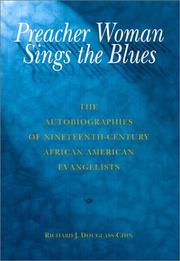
ISBN: 0826263011 9780826263018 9780826213112 0826213111 Year: 2001 Publisher: Columbia University of Missouri Press
Abstract | Keywords | Export | Availability | Bookmark
 Loading...
Loading...Choose an application
- Reference Manager
- EndNote
- RefWorks (Direct export to RefWorks)
"Preacher Woman Sings the Blues begins with the study of black evangelists Belinda, Jarena Lee, and Zilpha Elaw, continuing with Rebecca Cox Jackson, Sojourner Truth, Julia Foote, Amanda Smith, Elizabeth, and Virginia Broughton. The author's discussion of Zora Neale Hurston focuses on how Hurston operates as a connection between early black women evangelist writers and black women writing in America today. He ends with the works of Alice Walker, Toni Morrison, and Toni Cade Bambara." "By examining the early traditions prefiguring contemporary African American women's text and the impact that race and gender have on them, Douglas-Chin shows how the nineteenth-century black women's works are still of utmost importance to many African American writers today. Preacher Woman Sings the Blues makes a valuable contribution to literary criticism and theoretical analysis and will be welcomed by scholars and students alike."--Jacket
African American evangelists --- African American women --- Afro-American evangelists --- Evangelists, African American --- Evangelists
Book
ISBN: 0674267249 0674043456 9780674043459 Year: 2005 Publisher: Cambridge, Mass. ; London : Harvard University Press,
Abstract | Keywords | Export | Availability | Bookmark
 Loading...
Loading...Choose an application
- Reference Manager
- EndNote
- RefWorks (Direct export to RefWorks)
Rebecca's Revival is the remarkable story of a Caribbean woman--a slave turned evangelist--who helped inspire the rise of black Christianity in the Atlantic world. All but unknown today, Rebecca Protten left an enduring influence on African-American religion and society. Born in 1718, Protten had a childhood conversion experience, gained her freedom from bondage, and joined a group of German proselytizers from the Moravian Church. She embarked on an itinerant mission, preaching to hundreds of the enslaved Africans of St. Thomas, a Danish sugar colony in the West Indies. Laboring in obscurity and weathering persecution from hostile planters, Protten and other black preachers created the earliest African Protestant congregation in the Americas. Protten's eventful life--the recruiting of converts, an interracial marriage, a trial on charges of blasphemy and inciting of slaves, travels to Germany and West Africa--placed her on the cusp of an emerging international Afro-Atlantic evangelicalism. Her career provides a unique lens on this prophetic movement that would soon sweep through the slave quarters of the Caribbean and North America, radically transforming African-American culture. Jon Sensbach has pieced together this forgotten life of a black visionary from German, Danish, and Dutch records, including letters in Protten's own hand, to create an astounding tale of one woman's freedom amidst the slave trade. Protten's life, with its evangelical efforts on three continents, reveals the dynamic relations of the Atlantic world and affords great insight into the ways black Christianity developed in the New World.
African American evangelists --- African American women --- Protten, Rebecca, --- Afro-American evangelists --- Evangelists, African American --- Evangelists
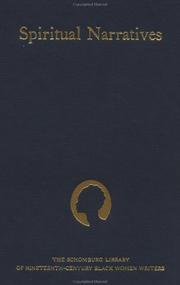
ISBN: 0195052668 Year: 1991 Publisher: New York (N.Y.): Oxford university press
Abstract | Keywords | Export | Availability | Bookmark
 Loading...
Loading...Choose an application
- Reference Manager
- EndNote
- RefWorks (Direct export to RefWorks)
African American evangelists --- African American missionaries --- African American women --- Biography --- Religion
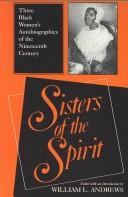
ISBN: 0253287049 Year: 1986 Publisher: Bloomington Indiana university press
Abstract | Keywords | Export | Availability | Bookmark
 Loading...
Loading...Choose an application
- Reference Manager
- EndNote
- RefWorks (Direct export to RefWorks)
African Americans --- African American women evangelists --- African American women --- Women evangelists, African American --- Women evangelists --- Religion --- Elaw, Zilpha, --- Foote, Julia A. J., --- Lee, Jarena, --- African American evangelists --- Biography
Book
ISBN: 0804797005 9780804797009 9780804790949 0804790949 9780804796989 080479698X Year: 2016 Publisher: Stanford, California : Stanford University Press,
Abstract | Keywords | Export | Availability | Bookmark
 Loading...
Loading...Choose an application
- Reference Manager
- EndNote
- RefWorks (Direct export to RefWorks)
The presence of women and African Americans not simply as viewers, but also as televangelists and station owners in their own right has dramatically changed the face of American religious broadcasting in recent decades. Colored Television looks at the influence of these ministries beyond the United States, where complex gospels of prosperity and gospels of sexual redemption mutually inform one another while offering hopeful yet socially contested narratives of personal uplift. As an ethnography, Colored Television illuminates the phenomenal international success of American TV preachers like T.D. Jakes, Creflo Dollar, Joyce Meyer, and Juanita Bynum. Focusing particularly on Jamaica and the Caribbean, it also explores why the genre has resonated so powerfully around the world. Investigating the roles of producers, consumers, and distributors, Marla Frederick takes a unique look at the ministries, the communities they enter, and the global markets of competition that buffer them.
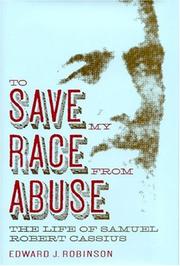
ISBN: 0817381481 9780817381486 0817315551 9780817315559 9780817355975 0817355979 Year: 2007 Publisher: Tuscaloosa University of Alabama Press
Abstract | Keywords | Export | Availability | Bookmark
 Loading...
Loading...Choose an application
- Reference Manager
- EndNote
- RefWorks (Direct export to RefWorks)
A fascinating and important figure in black American religious history. Samuel Robert Cassius was born to a slave mother and a white father in Virginia in 1853 and became a member of the Restorationist Movement (Disciples of Christ) while a coal miner in Indiana. For the rest of his long life (he died in 1931 at age 78), Cassius was an active evangelist, prolific publicist, dedicated leader of black Disciples, and an outspoken and uncompromising opponent of racism in religion and society. An indefatigable preacher, Cassius ranged throughout the Midwest, California
African Americans --- Race relations --- Racism --- Restoration movement (Christianity) --- African American evangelists --- Integration, Racial --- Race problems --- Race question --- Relations, Race --- Ethnology --- Social problems --- Sociology --- Ethnic relations --- Minorities --- Bias, Racial --- Race bias --- Race prejudice --- Racial bias --- Prejudices --- Anti-racism --- Critical race theory --- Christian sects --- Primitivism --- Afro-American evangelists --- Evangelists, African American --- Evangelists --- Religion. --- Religious aspects --- Christianity --- History. --- Cassius, Samuel Robert,
Book
ISBN: 9781478011781 9781478010654 Year: 2021 Publisher: Durham ; London : Duke University Press,
Abstract | Keywords | Export | Availability | Bookmark
 Loading...
Loading...Choose an application
- Reference Manager
- EndNote
- RefWorks (Direct export to RefWorks)
« In Kincraft : The Making of Black Evangelical Sociality Todne Thomas explores the interiority of black evangelical community life-a religious constituency often overshadowed by a white evangelical majority and the common equation of the "black Church" with an Afro-Protestant mainline. Informed by her fieldwork in an Afro-Caribbean and African American church association in the Atlanta metropolitan area, Thomas argues that church members co-create themselves as spiritual kin through the conceptual and performative labor of kincraft. Thomas attributes this kincraft-church members' constructions of one another as "brothers and sisters in Christ," "spiritual mothers," "spiritual fathers," "spiritual children,"and "prayer partners"-to religious and diasporic influences »--
Black theology. --- Evangelicalism --- Race relations --- Social aspects --- Religious aspects --- Christianity. --- Spiritual life --- African American evangelists. --- African American women in church work. --- Théologie noire --- Évangélisme --- Vie spirituelle --- Noires américaines dans la pastorale --- Relations raciales --- Social aspects. --- African American churches. --- Églises noires américaines --- Aspect religieux --- Christianisme --- United States
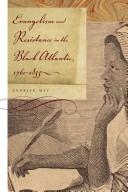
ISBN: 1282553046 9786612553042 0820336335 9780820336336 9780820327983 0820327980 Year: 2008 Publisher: Athens University of Georgia Press
Abstract | Keywords | Export | Availability | Bookmark
 Loading...
Loading...Choose an application
- Reference Manager
- EndNote
- RefWorks (Direct export to RefWorks)
This study focuses on the role of early African American Christianity in the formation of American egalitarian religion and politics. It also provides a new context for understanding how black Christianity and evangelism developed, spread, and interacted with transatlantic religious cultures of the eighteenth and early nineteenth centuries.
African American evangelists. --- Civil rights --- African Americans --- Religion and politics --- Christianity and literature --- American literature --- Afro-American evangelists --- Evangelists, African American --- Evangelists --- Church and civil rights --- Civil rights (Christian theology) --- Liberation theology --- Political science --- Politics, Practical --- Politics and religion --- Religion --- Religions --- Literature and Christianity --- Literature --- Christian literature --- Afro-Americans --- Black Americans --- Colored people (United States) --- Negroes --- Africans --- Ethnology --- Blacks --- Religious aspects --- Christianity. --- History. --- History --- African American authors --- History and criticism. --- Political aspects --- Religion.
| Listing 1 - 8 of 8 |
Sort by
|

 Search
Search Feedback
Feedback About UniCat
About UniCat  Help
Help News
News